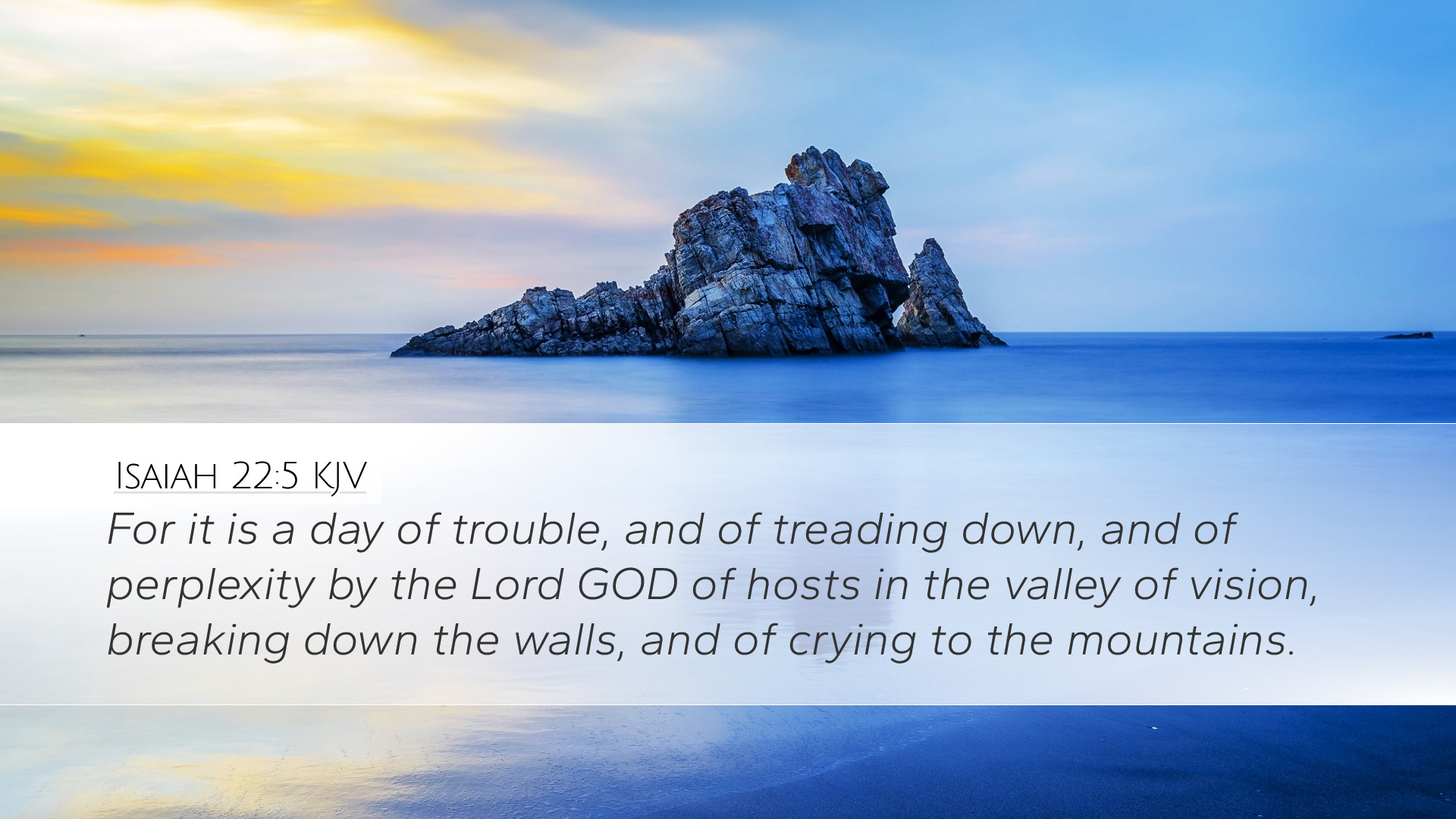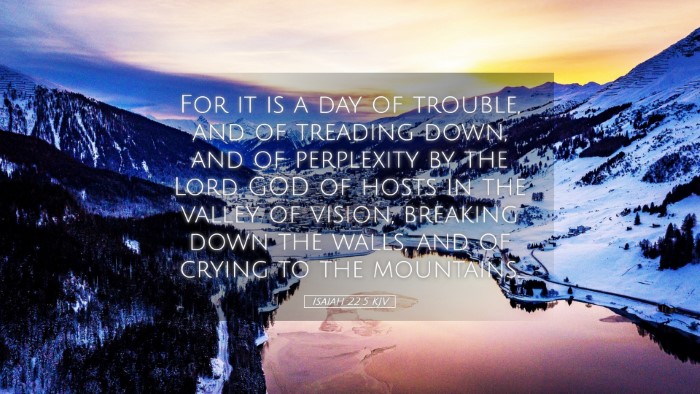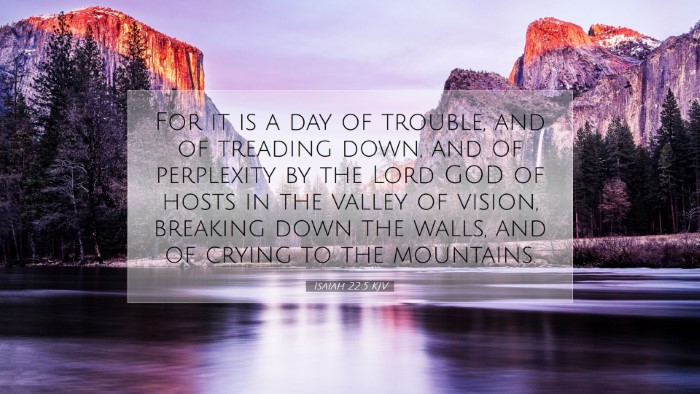Commentary on Isaiah 22:5
Isaiah 22:5 states, "For it is a day of trouble and treading down and perplexity by the Lord God of hosts in the valley of vision, breaking down the walls and of crying to the mountains." This verse encapsulates a moment of divine judgment and turmoil, reflecting both immediate circumstances and broader theological themes.
Historical Context
The backdrop of Isaiah 22 is the impending siege of Jerusalem. The prophet speaks to a time of national crisis when the people are threatened by invading forces. Understanding this historical context is vital for interpreting the gravity of the situation and the divine messages delivered through Isaiah.
Matthew Henry's Perspective
Matthew Henry draws attention to the notion of "trouble and treading down," highlighting God's sovereignty in times of distress. He emphasizes that this day of judgment is not simply a catastrophe but part of God's divine plan:
- Divine Sovereignty: Henry notes that God is actively involved in the affairs of nations, and this turmoil serves as a reminder of His control and authority over both the natural and political realms.
- Call to Reflection: The chaos presents an opportunity for God’s people to reflect on their relationship with Him, opening their eyes to their sins and the need for repentance.
- Future Hope: Amidst judgment, Henry insists that God’s people should hold onto hope; the day of calamity may lead to restoration as they turn back to Him.
Albert Barnes' Analysis
Albert Barnes offers an analytical approach focusing on the metaphorical implications of the "valley of vision." He asserts that this valley symbolizes a place of both spiritual insight and deep sorrow:
- The "Valley of Vision": Barnes interprets this phrase as emblematic of the unique perspective granted to the faithful. It suggests a location where divine truths are revealed, yet it is also a place marked by despair due to the people’s sinful choices.
- Collective Grief: The emphasis on "crying to the mountains" portrays a communal acknowledgment of their plight, signifying a corporate understanding of their need for divine intervention outside of their own capabilities.
- Warnings Ignored: Barnes stresses the importance of recognizing the warnings that God had given through His prophets; the refusal to heed these warnings ultimately leads to their present suffering.
Adam Clarke's Exegesis
In his commentary, Adam Clarke delves deeper into the elements of destruction anticipated in this verse. Clarke emphasizes the physical and spiritual implications of the siege of Jerusalem:
- Breaking Down of Walls: Clarke interprets the "breaking down of the walls" not only as a literal destruction of defenses but also as a removal of the barriers that protect the faithful, leading to vulnerability and chaos.
- Nature of Despair: The “crying” referenced points to a deep-seated anguish that transcends physical loss; it is indicative of a spiritual state where God’s people realize their need for Him in times when worldly defenses fail.
- Divine Discipline: Clarke highlights that this moment is not simply punitive but serves as a corrective measure for Israel, reflecting God’s desire to draw His people back to righteousness.
Theological Reflection
Isaiah 22:5 serves as a rich text for theological reflection. It underscores several significant themes relevant to contemporary readers:
- Judgment and Mercy: The discourse of divine judgment is laden with the potential for mercy, as God seeks to refine and restore His people through difficult circumstances.
- Human Dependence on God: The overwhelming sense of despair in the text illustrates humanity's fragile state and emphasizes the importance of recognizing one’s dependence on God.
- The Role of the Prophet: Isaiah’s unwavering call to repentance serves as a model for modern-day prophetic voices, urging both individuals and nations to seek alignment with God’s will amid crisis.
Practical Applications
For pastors, theologians, and scholars, Isaiah 22:5 offers profound lessons on the nature of God and His interactions with humanity. Here are practical applications drawn from this verse:
- Encouraging Repentance: In preaching and teaching, emphasize the importance of repentance and turning back to God during times of personal and collective distress.
- Resilience in Crisis: Encourage congregations to maintain faith in God's sovereignty and unfailing love, even in the face of significant challenges.
- Awareness and Warning: Address the need for vigilance in recognizing spiritual warnings in today’s society, paralleling the context of Isaiah’s message with current global events.
Conclusion
Isaiah 22:5 serves as a vital reminder of the interplay between divine judgment and redemptive opportunity. It speaks powerfully to the contemporary believer, calling forth a response of humility, reflection, and an earnest pursuit of God amidst turmoil. As we dissect this verse through the lenses of esteemed commentators like Matthew Henry, Albert Barnes, and Adam Clarke, we uncover layers of meaning that illuminate God’s character and His desire for restoration in the hearts of His people.


